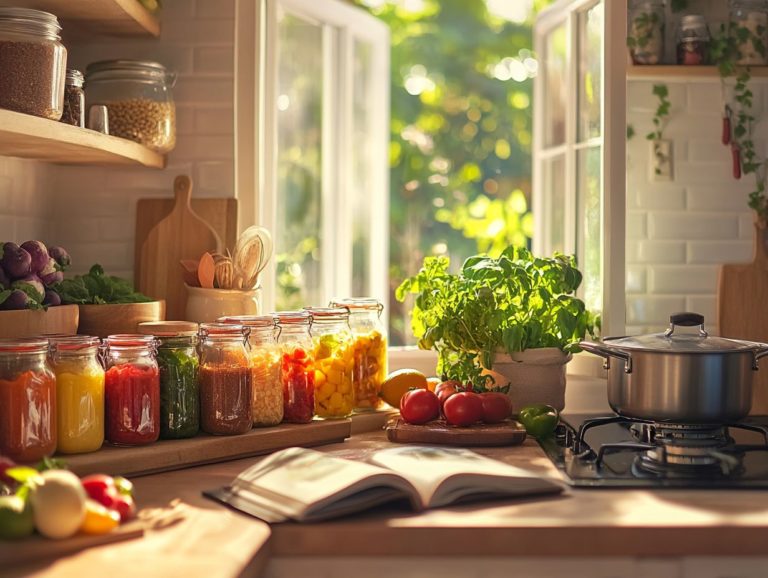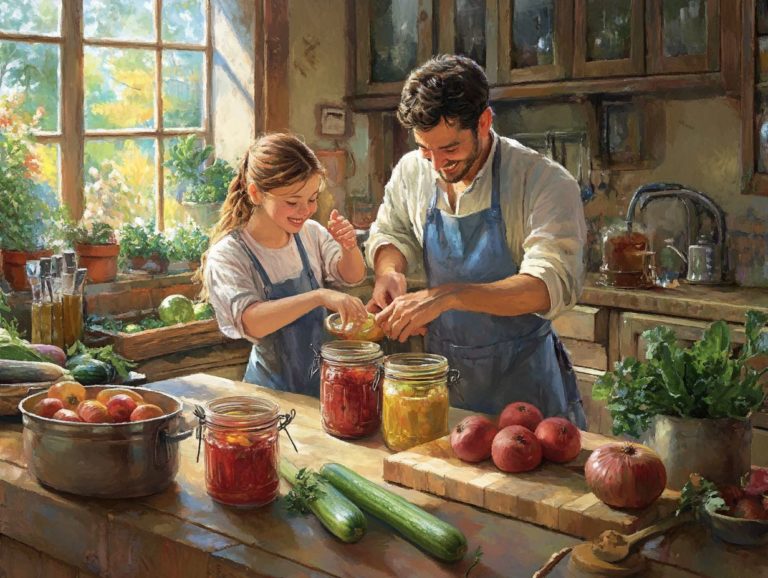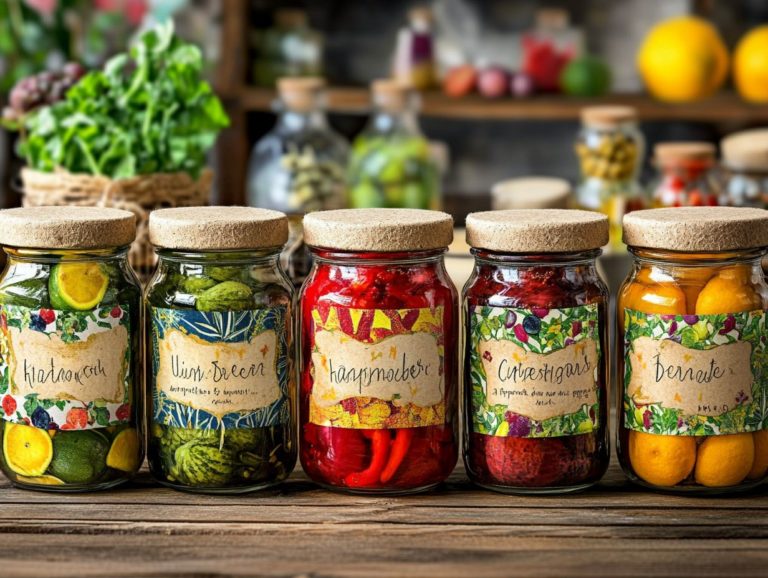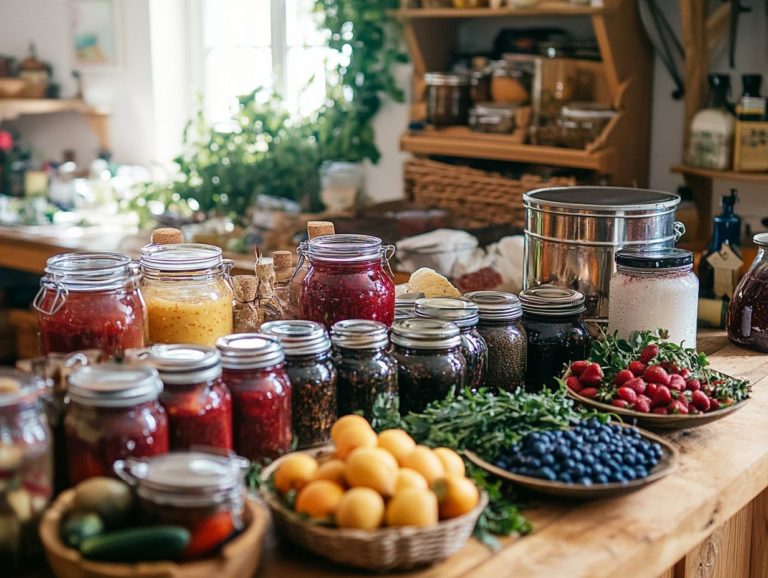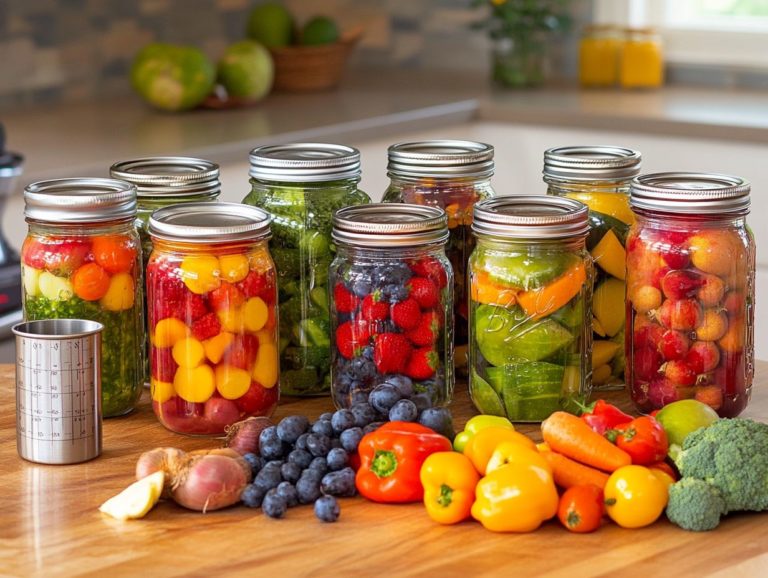10 Community Gardens for Canning Produce
Immerse yourself in the vibrant realm of community gardens, where neighbors unite to grow fresh produce and forge meaningful connections.
From the flourishing FairShare Farm to the welcoming Bancroft-Meridian Garden, each location presents unique opportunities for gardening enthusiasts like you.
This exploration highlights ten exceptional community gardens, delves into the myriad benefits of joining one, and offers essential tips to enhance your gardening experience.
Whether you re a seasoned green thumb or just beginning your gardening journey, join us to see how these gardens can transform your life and strengthen your community!
Contents
- Key Takeaways:
- FairShare Farm
- West Bank Community Garden
- Como Corner Community Garden
- Gethsemane Community Garden
- Soo Line Community Garden
- Peaceful Patch Community Garden
- Corcoran Community Garden: A Hub for Fresh Produce and Local Initiatives
- St Anthony Park Community Garden
- Merriam Station Community Garden
- Bancroft-Meridian Garden
- What Are Community Gardens and How Do They Work?
- What Are the Benefits of Joining a Community Garden?
- How Can One Find a Community Garden in Their Area?
- What Are the Guidelines and Rules for Participating in a Community Garden?
- What Are Some Tips for Canning Produce from a Community Garden?
- How Can One Get Involved with Community Gardens in Their Community?
- Frequently Asked Questions
- 1. What are the top 10 community gardens for canning produce in the area?
- 2. How can I contact the community gardens listed for canning produce?
- 3. Are these community gardens open to the public for canning produce?
- 4. Is there a fee to use the community gardens for canning produce?
- 5. What types of produce can I expect to find at these community gardens for canning?
- 6. Can I volunteer at these community gardens while also using them for canning produce?
Key Takeaways:
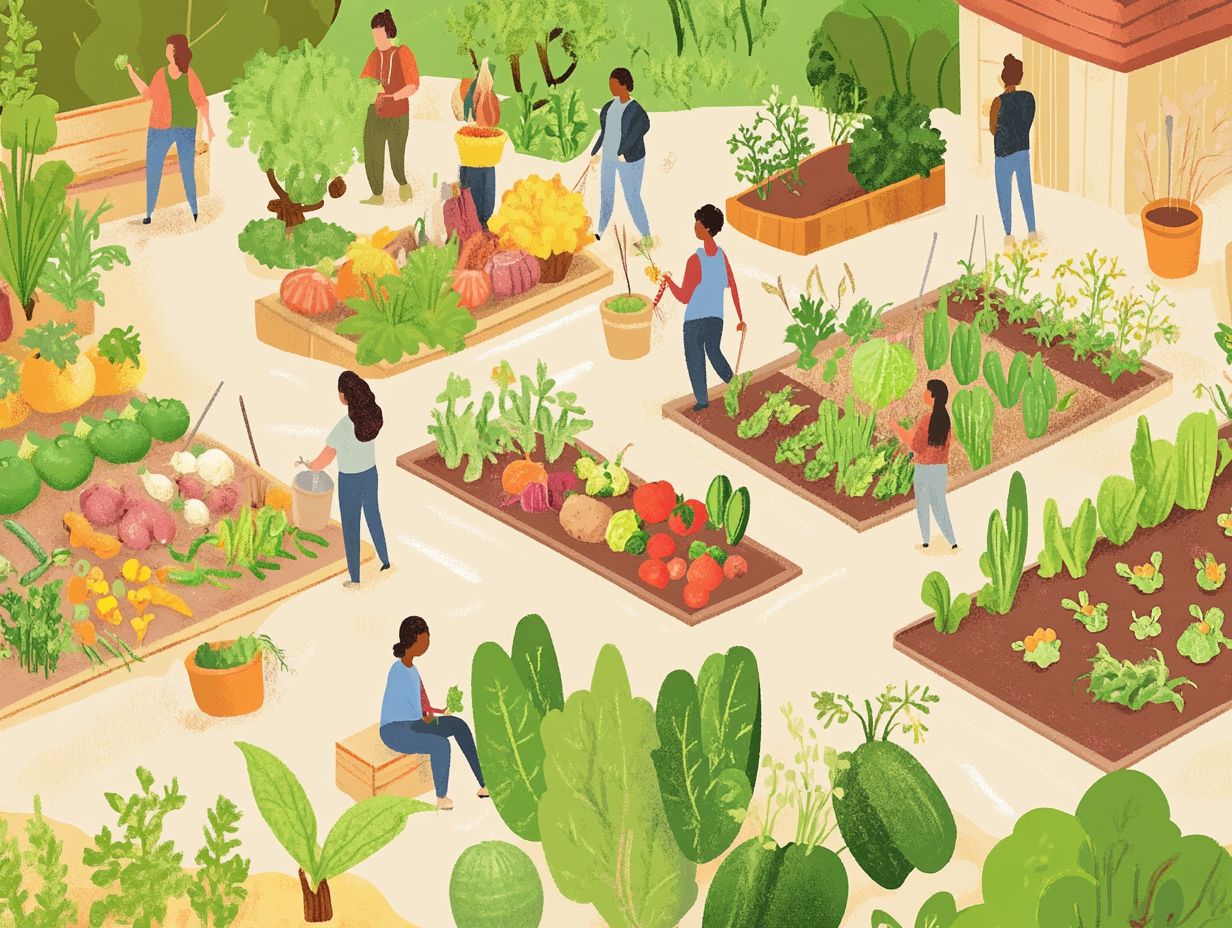
- Discover how to find community gardens like FairShare Farm and West Bank.
- Understand the rules for joining gardens like Como Corner and Gethsemane.
- Get canning tips and connect with gardens like Soo Line and Merriam Station.
FairShare Farm is located in Michigan. It embodies local food production by cultivating a sustainable environment that prioritizes organic gardening and food security for your community.
This farm doesn’t just grow fresh vegetables; it fosters a spirit of self-reliance and engagement, creating a space for you to connect with your food sources and learn about sustainable agricultural practices.
By focusing on traditional plant types that have been grown for many generations and healthy soil, FairShare Farm collaborates with local initiatives to support a bountiful harvest of vegetables that enriches both your pantry and the local economy, enabling you to enjoy fresh produce.
With a strong commitment to education, the farm regularly hosts workshops and events designed to teach participants about organic gardening techniques, highlighting the importance of variety of plants and soil health. This proactive approach empowers you and your community to make informed food choices.
FairShare Farm proudly sells its seasonal produce at local farmers’ markets, enhancing food security by giving you access to fresh, locally sourced food. The inclusion of heirloom vegetables not only preserves agricultural heritage but also offers unique flavors and nutritional benefits, encouraging you to embrace diverse diets and deepen your connection to the land.
West Bank Community Garden
The West Bank Community Garden stands as a vibrant hub for those like you who are eager to engage in gardening, cultivating fresh vegetables and fostering local food connections.
In its thoughtfully designed layout, a diverse array of vegetables flourishes think tomatoes, peppers, cucumbers, and leafy greens all lovingly nurtured by dedicated gardeners.
This garden becomes a gathering place throughout the year, hosting community events that unite individuals. Here, you can participate in educational workshops that explore sustainable gardening practices. You ll have the chance to learn preserving techniques like canning and pickling, enhancing your skills while exchanging recipes and methods with fellow enthusiasts.
These gatherings do more than just promote the joy of gardening; they cultivate relationships and foster a profound sense of belonging among community members, encouraging sharing of recipes and homemade goods.
Get involved today and watch your community blossom!
Como Corner Community Garden
Como Corner Community Garden stands as a vibrant testament to growing food in a way that is good for the environment, where you can join fellow community members in cultivating a diverse array of organic produce.
The garden prioritizes eco-friendly practices. It focuses on healthy soil through composting, which uses kitchen scraps and yard waste to create nutrient-rich soil, and crop rotation to ensure plants thrive. You ll work alongside others to harness sunlight effectively, utilizing raised beds that maximize exposure and promote biodiversity.
This community hub is more than just a green sanctuary. It s also a place to learn!
Here, you can acquire valuable skills, from preserving your harvest with time-tested canning techniques to sharing scrumptious recipes that showcase the garden s bountiful offerings.
Such engagement fosters a genuine sense of belonging, empowering you and your neighbors to embrace sustainability at home and within the broader community.
Gethsemane Community Garden
Gethsemane Community Garden gives you the power to engage in local food production while cultivating a diverse array of vegetables that nurture community spirit and wellness.
Imagine a garden filled with vibrant tomatoes, crisp cucumbers, leafy greens, and hearty root vegetables like beans and corn. This delightful variety enriches your diet and enhances local food security by offering fresh, nutritious options that lessen reliance on distant supply chains.
The community actively embraces programs promoting traditional preserving techniques like canning and pickling. Regular workshops invite you to participate, sharing recipes and hands-on experiences that transform your bountiful harvest into preserved treasures. Learning about seasonal foods perfect for canning ensures the enjoyment of your garden’s bounty extends well beyond the growing season.
Soo Line Community Garden
Soo Line Community Garden stands as a vital resource for you and your neighbors, offering a rich selection of vegetables that enhance local food security.
The garden features an impressive array of produce, from succulent tomatoes and vibrant peppers to fresh greens and hearty root vegetables, all cultivated to satisfy the diverse tastes of its participants. By creating a space for collaboration, it strengthens your connection to fresh, sustainable food sources.
Engaging activities like popular canning workshops allow you to learn invaluable skills to extend the life of your harvest. These initiatives empower you to make healthier choices and foster a culture of knowledge sharing, ensuring everyone can benefit from the garden s abundant yields.
Peaceful Patch Community Garden
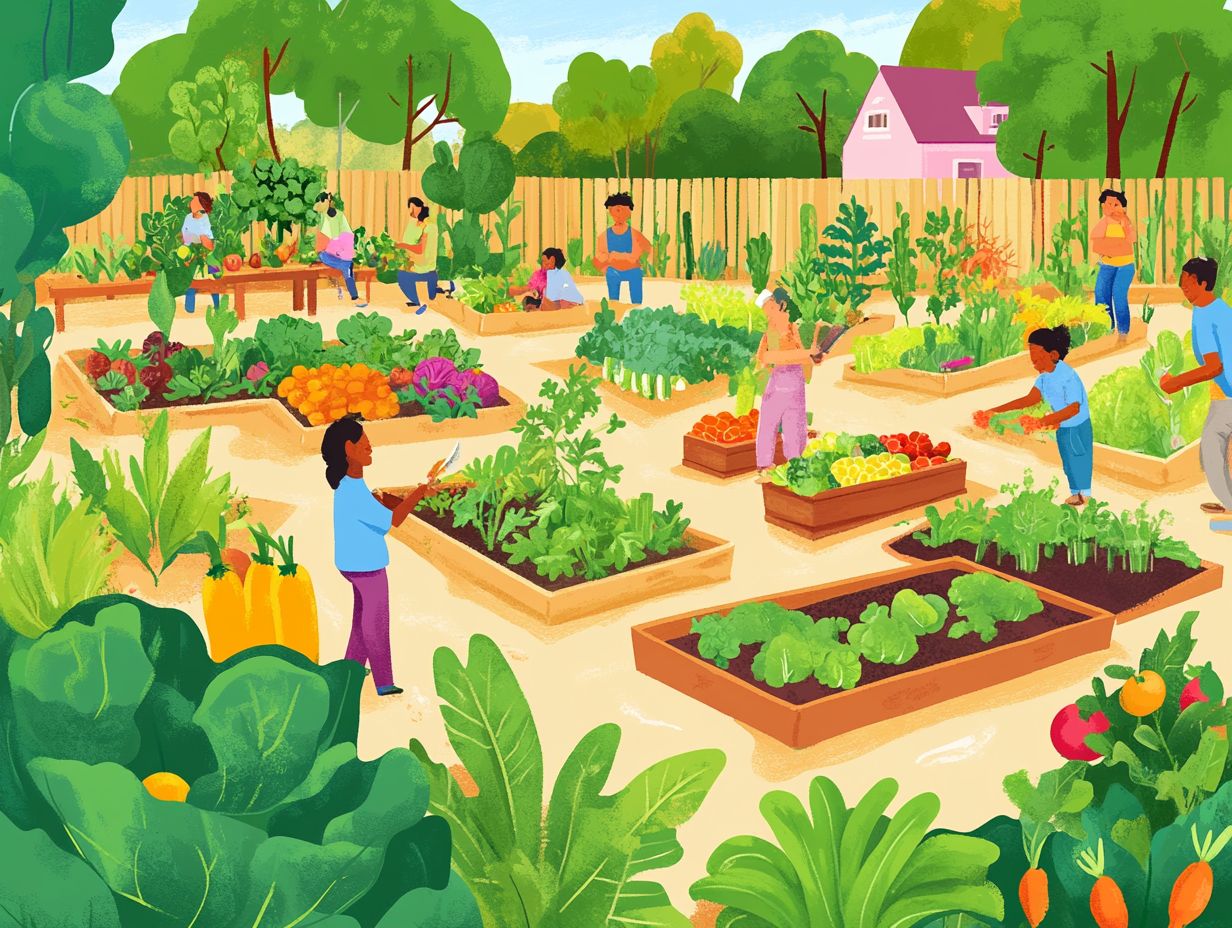
Peaceful Patch Community Garden truly shines as a premier sustainable gardening initiative, inviting you to dive into cultivating diverse vegetables like heirloom varieties while supporting local food systems.
You ll quickly notice the garden s dedication to environmentally friendly practices, showcased through its organic farming techniques like composting and rainwater harvesting. These methods enhance soil health and conserve vital resources.
Regular community events and workshops offer you the chance to learn about preservation methods and local recipes. These gatherings do more than just emphasize sustainability; they forge connections among neighbors, creating a space for sharing tips and delicious dishes.
In this vibrant atmosphere, Peaceful Patch becomes your go-to hub for learning, collaboration, and cultivating a deeper appreciation for nature and food.
Corcoran Community Garden: A Hub for Fresh Produce and Local Initiatives
Corcoran Community Garden is a great example of community spirit. Join residents in growing fresh vegetables like heirloom carrots and supporting local food initiatives, including sustainable cooking classes and preserving workshops.
This vibrant space showcases a rich assortment of cultivated vegetables. You ll find tomatoes, kale, and peppers that nourish the community and enhance local food security. By sourcing produce locally, the garden plays a crucial role in alleviating food deserts and increasing access to healthy options.
It serves as an educational hub for residents of all ages. Here, you ll learn essential skills such as food preservation and canning, ensuring that the wisdom of sustainability is passed on through generations.
Through engaging workshops and hands-on experiences, learn how to keep your harvests thriving. Extend the life of your vegetables while cultivating a culture of shared resources and knowledge that benefits everyone involved.
St Anthony Park Community Garden
The St. Anthony Park Community Garden offers a nurturing environment for you to grow your own vegetables and herbs. Exchange valuable knowledge about gardening and food preservation techniques like canning and pickling.
This vibrant space promotes collaboration among individuals eager to explore various gardening practices. You can try organic methods or planting different crops together to help each other grow, all while emphasizing sustainability and biodiversity.
Grow amazing vegetables that thrive under your care! Cultivate a variety of produce, from tomatoes to peppers and leafy greens. The garden also hosts workshops that inspire you to learn canning techniques and share recipes.
By participating in these programs, boost your culinary skills and strengthen your community ties. Form a supportive and creative network around you.
Merriam Station Community Garden
Merriam Station Community Garden is a vital part of your community. It offers the opportunity to cultivate vegetables while championing local food resources and sustainable practices.
This vibrant garden doesn t just grow an array of fresh vegetables like tomatoes, peppers, and leafy greens. It also serves as an educational hub for sustainable agriculture.
Residents gather for workshops that teach essential skills such as preserving food and canning techniques. Learn how to savor the fruits of your labor throughout the year!
These initiatives enrich your gardening knowledge while nurturing a sense of community spirit. Inspire neighbors to support one another in their green endeavors and share the abundant harvests of heirloom varieties.
Bancroft-Meridian Garden
Bancroft-Meridian Garden invites you to join a vibrant community of gardening enthusiasts. This group is dedicated to growing a diverse array of vegetables, including carrots and beans, while enhancing local food initiatives.
This lively hub gathers individuals eager to cultivate their green thumbs. It plays a crucial role in fortifying local food systems.
Through engaging community workshops, you ll acquire essential skills in preservation. Learn how to ensure that none of your bountiful harvests go to waste, especially when it comes to pickles and tomato sauces.
These educational sessions delve into canning techniques. Exchange popular recipes spotlighting seasonal produce, like tangy tomato sauces and delightful fruit jams.
By sharing knowledge and culinary inspiration, this community fosters a sustainable food network. Relish local flavors, including those from the farmers market, throughout the year!
What Are Community Gardens and How Do They Work?
Community gardens are places where people come together to grow vegetables. They share resources and promote sustainable gardening practices while enhancing local food systems.
These vibrant green spaces offer fresh produce and cultivate a deep sense of belonging among participants, who come from diverse backgrounds. Typically, they operate under a structure that encourages teamwork. You might even find yourself part of a committee managing tasks like planting schedules, maintenance duties, and resource sharing, all while focusing on organic and sustainable practices.
For example, embracing techniques like raised bed gardening can improve soil quality and maximize your yield. Permaculture, a method of sustainable farming that works with nature, promotes biodiversity and resilience in the garden. By engaging in these shared responsibilities, you can make a meaningful impact on food security in your neighborhood, ensuring that nutritious food is within reach for everyone involved.
What Are the Benefits of Joining a Community Garden?
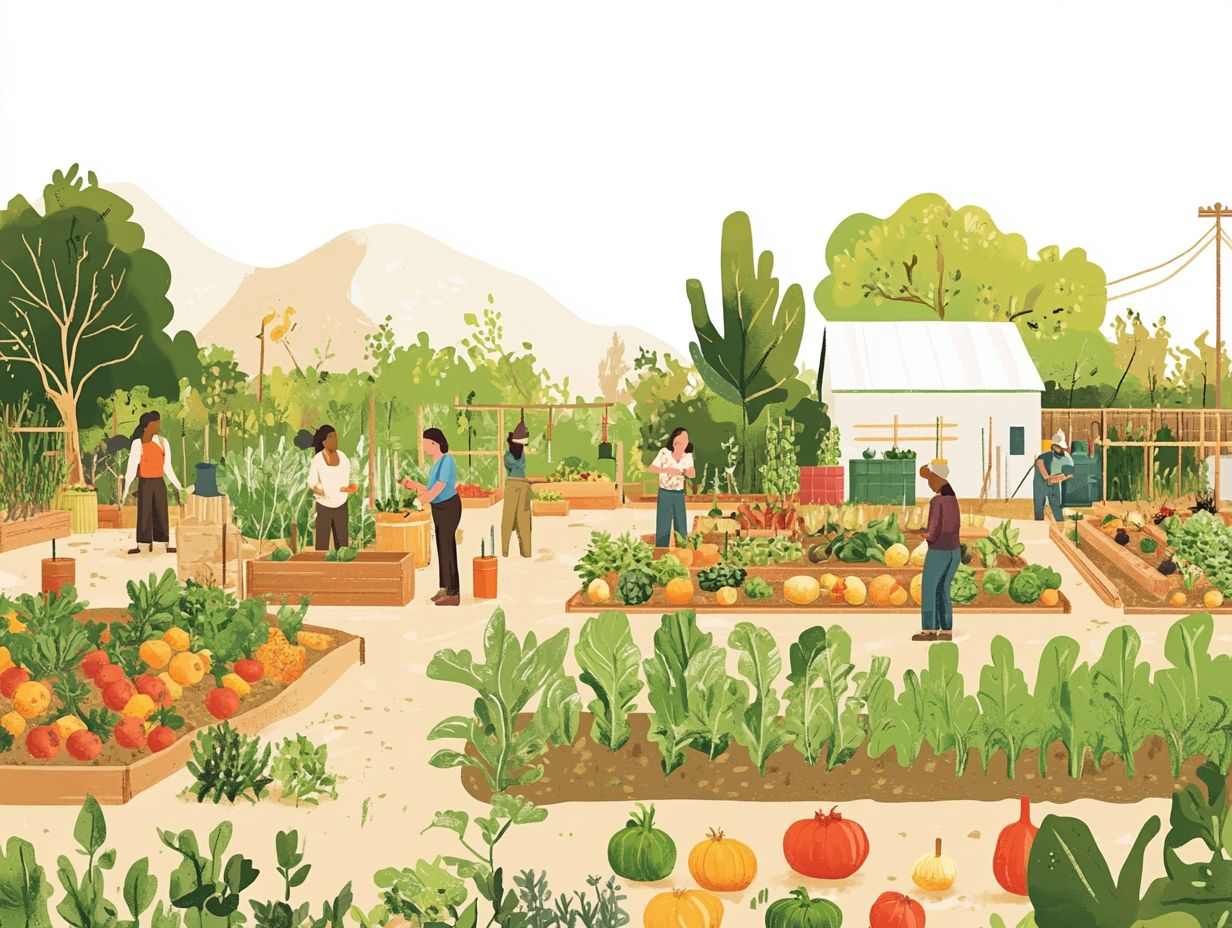
Join a community garden today and unlock amazing benefits! You ll gain access to fresh vegetables, create meaningful social connections, and gain a richer understanding of local food systems, including the importance of organic gardening.
As you cultivate your own produce, you ll elevate your diet leading to better overall health and develop a deeper appreciation for the origins of your food. This shared space fosters community bonding, allowing neighbors to come together to exchange gardening tips, share their bountiful harvests, and celebrate the changing seasons.
Many gardens offer informative workshops that delve into gardening techniques, composting, and food preservation methods, equipping you with skills to make sustainable choices. These collective experiences can ignite friendships and strengthen community ties, creating a supportive environment for everyone involved.
How Can One Find a Community Garden in Their Area?
Discovering a community garden in your area can be a fulfilling step toward engaging in local food production and embracing sustainable gardening practices. It allows you to cultivate fresh produce and nurtures connections within your community.
To embark on your search, tapping into social media platforms can be incredibly advantageous. Many local gardens actively showcase their events, volunteer opportunities, and gardening tips on Facebook and Instagram. Reaching out to regional agricultural organizations can provide valuable insights and recommendations for nearby gardens.
Many of these community gardens host workshops focusing on essential skills like canning and food preservation, including local fields for fresh produce canning, giving you the power to maximize your harvest and contribute to a culture of sustainability through creative uses of vinegar and spices.
What Are the Guidelines and Rules for Participating in a Community Garden?
Participating in a community garden entails adhering to specific guidelines and rules that promote equitable gardening practices and cultivate harmony within the community, ensuring every gardener respects the soil and contributes to the ecosystem.
You ll find that plot maintenance is a key aspect. Each gardener is expected to keep their designated area tidy and productive, fostering a sense of responsibility and ownership, especially when it involves caring for heirloom varieties.
Sharing harvests is equally important. It strengthens the bonds among participants and ensures that any excess produce is enjoyed rather than wasted. Embracing sustainable practices like composting and organic gardening methods significantly boosts the health of the soil and overall ecosystem.
By following these principles, you can play an integral role in successful food preservation efforts, including canning and pickling, ensuring that your community garden thrives sustainably for generations to come.
What Are Some Tips for Canning Produce from a Community Garden?
Canning produce from a community garden can be a truly rewarding way to preserve your harvest and savor fresh flavors throughout the year. To find the best supplies, check out the 5 best local markets for canning ingredients. The techniques are both simple and effective, making the process accessible to anyone ready to dive in.
To ensure your jars are primed for the delightful journey ahead, start by thoroughly sterilizing them. This crucial step prevents unwanted bacteria and safeguards the integrity of your food a detail that s often overlooked but vital for success.
Selecting the right brine a salty solution used to preserve food is equally essential; not only does it enhance the flavor of your creations, like pickles, but it also extends their shelf life. By incorporating a variety of spices, you can elevate the overall taste, giving each jar its own unique flair.
Whether you re crafting zesty dill pickles or tangy tomato sauce using fresh ingredients from your garden, these foundational techniques transform the canning experience into something not just enjoyable, but deeply fulfilling.
How Can One Get Involved with Community Gardens in Their Community?
Dive into your local community gardens! It’s a fantastic way to support sustainable practices and meet like-minded folks while connecting with local food initiatives, including those that emphasize Michigan agriculture.
By volunteering your time, you can actively contribute to the upkeep of community gardens while acquiring valuable skills and insights into gardening techniques. Participating in workshops will deepen your understanding of sustainable agriculture, allowing you to forge a stronger connection with the environment.
Joining community events fosters a sense of belonging, helping you build bonds with neighbors and encourage social interaction. Such involvement enriches your personal growth and well-being, strengthens community ties, cultivates healthy habits, and promotes local food production, ensuring nourishing options for all.
Frequently Asked Questions
1. What are the top 10 community gardens for canning produce in the area?
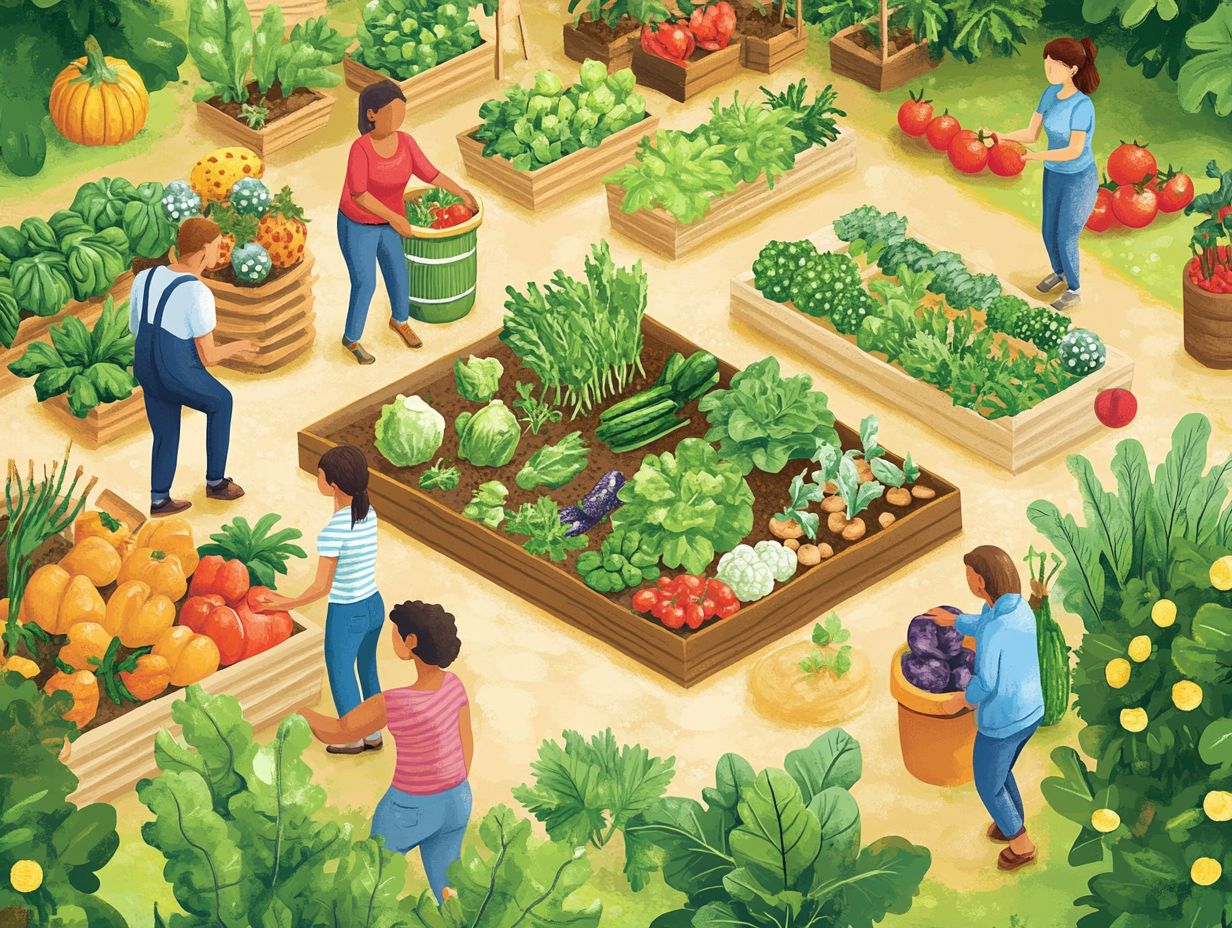
Answer:
The top 10 community gardens for canning produce in the area are:
- FairShare Farm
- West Bank Community Garden
- Como Corner Community Garden
- Gethsemane Community Garden
- Soo Line Community Garden
- Peaceful Patch Community Garden
- Corcoran Community Garden
- St Anthony Park Community Garden
- Merriam Station Community Garden
- Bancroft-Meridian Garden
2. How can I contact the community gardens listed for canning produce?
Answer:
You can contact the community gardens for canning produce by visiting their locations or reaching out to them through phone or email. For additional resources, check out local food co-ops for canning supplies. The contact information for each garden is listed next to their names.
3. Are these community gardens open to the public for canning produce?
Answer:
Yes, all of the community gardens listed are open to the public for canning produce. For those interested in canning fruits, exploring the 5 best local orchards can provide valuable options. They are designed to be accessible and inclusive for all members of the community.
4. Is there a fee to use the community gardens for canning produce?
Answer:
Some of the community gardens may require a small fee for use, while others are free. It is best to contact the gardens directly to inquire about any fees associated with canning produce, especially if you are looking for farmers markets for canning supplies.
5. What types of produce can I expect to find at these community gardens for canning?
Answer:
The types of produce available at the community gardens for canning will vary depending on the season and what is being grown by the community members. However, you can typically find a variety of fruits and vegetables that are perfect for canning, and you can explore local markets for fresh canning produce.
6. Can I volunteer at these community gardens while also using them for canning produce?
Answer:
Yes, most community gardens rely on volunteers to help maintain and care for the gardens. You can inquire about volunteer opportunities while also using the gardens for canning produce, which supports local food security and sustainable gardening practices.
Ready to get started? Visit your local community gardens or participate in canning workshops today!

